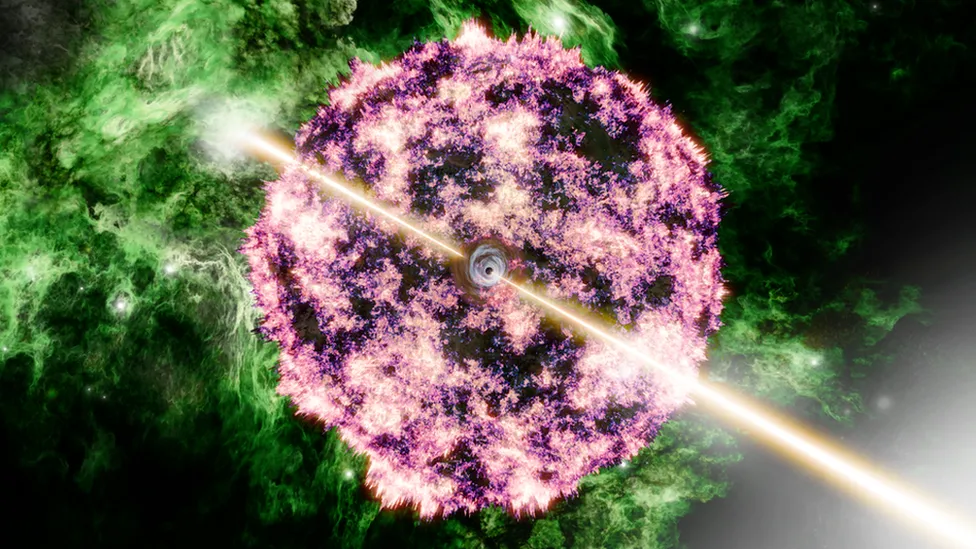https://www.swpc.noaa.gov/news/update-g ... il-23-2023
NOAA report:
What implications is this supposed to have?
Stars, supernovae, black holes and stellar remnants
-
weatheriscool
- Posts: 13583
- Joined: Sun May 16, 2021 6:16 pm
-
firestar464
- Posts: 823
- Joined: Wed Oct 12, 2022 7:45 am
Re: Stars, supernovae, black holes and stellar remnants
Nothing apparently?firestar464 wrote: ↑Sun Mar 24, 2024 6:19 pm https://www.swpc.noaa.gov/news/update-g ... il-23-2023
NOAA report:
What implications is this supposed to have?
Re: Stars, supernovae, black holes and stellar remnants
Powers wrote: ↑Sun Mar 24, 2024 9:25 pmNothing apparently?firestar464 wrote: ↑Sun Mar 24, 2024 6:19 pm https://www.swpc.noaa.gov/news/update-g ... il-23-2023
NOAA report:
What implications is this supposed to have?
https://thehill.com/homenews/nexstar_me ... t-to-know/(The Hill) …on Sunday, the SWPC (Space Weather Prediction Center) warned that the storm had reached “severe” G4 conditions. Those conditions could change into Monday, the agency said in a Sunday evening update.
…
The G4 storming observed Sunday is considered “severe,” the SWPC notes, saying a storm of this caliber is “a major disturbance in Earth’s magnetic field; often varying intensity between lower levels and severe storm conditions over the course of the event.” As alarming as it may sound, the agency is advising otherwise.
“The public should not anticipate adverse impacts and no action is necessary, but they should stay properly informed of storm progression by visiting our webpage,” the SWPC said in a Sunday update, adding that “infrastructure operators have been notified to take action to mitigate any possible impacts.”
…
Officials also noted that there may be increased and more frequent voltage control problems that are “normally mitigable;” an increased chance at “anomalies or effects to satellite operations;” and “more frequent and longer periods of GPS degradation possible.
Don't mourn, organize.
-Joe Hill
-Joe Hill
-
firestar464
- Posts: 823
- Joined: Wed Oct 12, 2022 7:45 am
Re: Stars, supernovae, black holes and stellar remnants
https://phys.org/news/2024-03-stunning- ... birth.html
Stunning James Webb images show birth and death of massive stars
Stunning James Webb images show birth and death of massive stars
-
firestar464
- Posts: 823
- Joined: Wed Oct 12, 2022 7:45 am
Re: Stars, supernovae, black holes and stellar remnants
https://phys.org/news/2024-03-analysis- ... -hole.html
New analysis reveals a tiny black hole repeatedly punching through a larger black hole's disk of gas
New analysis reveals a tiny black hole repeatedly punching through a larger black hole's disk of gas
-
weatheriscool
- Posts: 13583
- Joined: Sun May 16, 2021 6:16 pm
Re: Stars, supernovae, black holes and stellar remnants
Supercomputer simulations decode the mass puzzle of the first stars
https://phys.org/news/2024-04-supercomp ... uzzle.html
by ASIAA
https://phys.org/news/2024-04-supercomp ... uzzle.html
by ASIAA
Ching-Yao Tang and Dr. Ke-Jung Chen from the Institute of Astronomy and Astrophysics, Academia Sinica (ASIAA) have made substantial progress in decoding the birth mass of the first stars using the powerful supercomputer at Berkeley National Lab.
This new research is reported in the latest issue of the Monthly Notices of the Royal Astronomical Society.
During the earliest stages of the universe, only hydrogen and helium existed following the Big Bang, and crucial life-sustaining elements like carbon and oxygen had yet to emerge. Approximately 200 million years later, the first stars, known as Population III (Pop III) stars, began forming.
These stars initiated the production of heavier elements through nuclear burning at their cores. As these stars reached the end of their life cycles, some went supernovae, creating powerful explosions that dispersed newly synthesized elements into the early universe, becoming the foundation for life.
- Time_Traveller
- Posts: 2234
- Joined: Sun May 16, 2021 4:49 pm
- Location: San Francisco, USA, June 7th 1929 C.E
Re: Stars, supernovae, black holes and stellar remnants
Brightest-ever cosmic explosion solved but new mysteries sparked
https://www.bbc.co.uk/news/science-environment-687875343 hours ago
Researchers have discovered the cause of the brightest burst of light ever recorded.
But in doing so they have run up against two bigger mysteries, including one that casts doubt on where our heavy elements - like gold - come from.
The burst of light, spotted in 2022, is now known to have had an exploding star at its heart, researchers say.
But that explosion, by itself, would not have been sufficient to have shone so brightly.
And our current theory says that such exploding stars, known as supernovas, also produce all the heavy elements in the universe such as gold and platinum.
"We all have our time machines, don't we. Those that take us back are memories...And those that carry us forward, are dreams."
-H.G Wells.
-H.G Wells.
-
weatheriscool
- Posts: 13583
- Joined: Sun May 16, 2021 6:16 pm
Re: Stars, supernovae, black holes and stellar remnants
Stellar winds of three sun-like stars detected for the first time
https://phys.org/news/2024-04-stellar-sun-stars.html
by University of Vienna
https://phys.org/news/2024-04-stellar-sun-stars.html
by University of Vienna
An international research team led by a researcher from the University of Vienna has for the first time directly detected stellar winds from three sun-like stars by recording the X-ray emission from their astrospheres, and placed constraints on the mass loss rate of the stars via their stellar winds.
Astrospheres, stellar analogs of the heliosphere that surrounds our solar system, are very hot plasma bubbles blown by stellar winds into the interstellar medium, a space filled with gas and dust. The study of the stellar winds of low-mass stars similar to the sun allows us to understand stellar and planetary evolution, and ultimately the history and future of our own star and solar system. Stellar winds drive many processes that evaporate planetary atmospheres into space and therefore lead to atmospheric mass loss.
